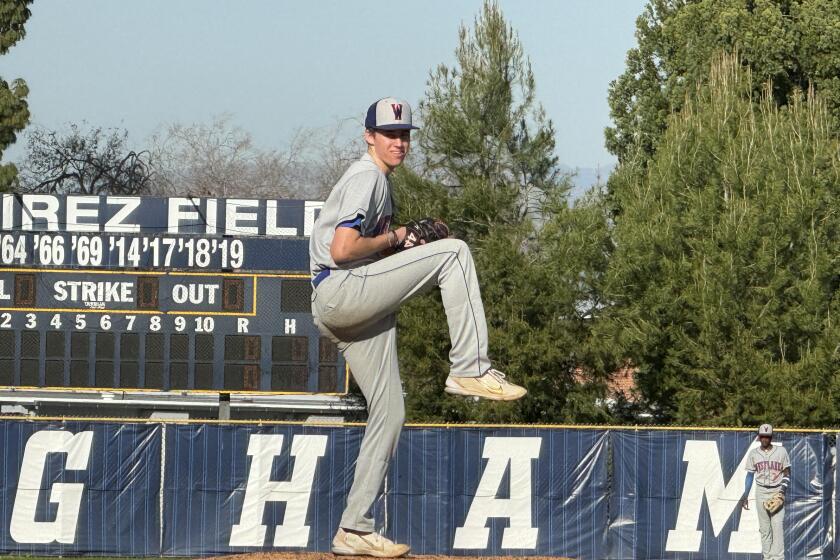<i> Mixing Girls’ Sports and Muslim Tradition</i>
- Share via
The temperature in Pasadena was 90 degrees and the soccer coach was on the field wearing a scarf covering her head, a long-sleeved shirt and pants that reached down to her toes. She wasn’t leading some kind of brutal conditioning drill, but teaching little girls to dribble a soccer ball--little Muslim girls, many of them dressed just like her.
Coach Hoda Shawky is no Brandi Chastain. You’ll never catch her on the field peeling down to her sports bra after a game. And that’s what makes her a role model to the girls attending this unusual summer sports program--a camp for girls whose religious tradition dictates a kind of modesty that might seem out of place on a basketball court or a soccer field.
Unconventional dress aside, the two-week camp has all the elements of a typical sports program, and then some. About 30 campers--Muslim girls from 7 to 16--meet on the campus of Pasadena’s Westridge School for Girls to learn skills in basketball, soccer, volleyball and self-defense. There are field trips, camp songs, water fights ... and there are also daily prayers and lunchtime talks about Islamic principles and their role in life and sports.
It is a place where Muslim girls get a chance to step outside traditional boundaries and imagine a new role for themselves as athletes.
“We give them a chance to try things they might never have thought they could do, in an atmosphere that’s not intimidating,” said camp director Kristina Provost. “Nobody’s going to laugh or criticize you; there’s a sense of understanding here, and respect.”
Provost is not a Muslim, but she is an athlete. She grew up playing soccer, swimming and mountain biking, “and I know how it feels to have people go ‘tomboy!’ just because you want to play a sport,” she says.
But she does not know how it feels to play a game after fasting all day, as Muslims do during the holy month of Ramadan. Or to take to the field cloaked in clothing that could subject them to ridicule. That’s where Shawky and the other Muslim coaches come in.
Shawky, 24, began playing soccer in Orange County at age 9. For her, it was a way to fit in, “to show that I was cool, like everyone else.”
Then came adolescence, when she decided to follow conservative Muslim traditions that require girls to cover their hair, arms and legs with clothing loose-fitting enough to shield their bodies from view. It was a crossroads for her, in soccer and in life. She knew her hijab, or scarf, and long pants would call attention to her on the soccer field. But she also saw an opportunity to dispel stereotypes about Muslim girls.
“Playing in the spotlight gave me something to prove,” she said. Ultimately, it pushed her to improve her soccer skills, as she came to understand the value of role models to young Muslim girls. “In every game, I knew people would be watching me. The way I played, the way I conducted myself ... that would set an example for other [Muslim] girls. I wanted to show them what was possible.” The only drawback? The same thing she’s experiencing on this sweltering day, as she herds her campers off the field. “It’s really hot, playing in all these clothes.”
The Muslim Girls’ Sports Camp in Pasadena was launched four years ago by a group of Muslim women led by Semeen Issa, a schoolteacher and mother of three, whose two daughters play soccer with AYSO. She saw how much they loved the game and wanted to introduce other Muslim families to the notion of sports as an outlet for girls. The camp is the only one of its kind in the country, she said.
“It’s really hard on a child being different,” Issa said. “Learning to play sports helps give Muslim girls self-confidence, develops their leadership skills. They get a different message here than they might get at home or at school: ‘Get out there. Don’t be afraid to try something new.”’
Issa brings in local high school and college athletes to teach the campers, who come from all over Southern California and hail from a dozen countries and ethnic groups. “Having them as role models is so important,” she said. “Look around and you don’t see any Muslim women athletes in professional sports. We have to create that as a possibility.”
In many ways, “Muslim girls are raised in a bubble,” says Edina Lekovic, managing editor of the Islamic magazine Minaret. “There are not many activities that focus on them, that give them a real opportunity to see their potential. This is not just about learning to play soccer or basketball, but it’s a way of empowering the girls and encouraging them to set goals.”
Lekovic spoke to the campers last week about sports and social responsibility. “What can people learn about us from watching us play?” she asked. “They can learn that we are just like other girls, because most people think Muslims are different,” one teenager said. “They can see that we treat everybody fairly,” offered another.
Then a tiny girl in blue jeans, a long shirt and a blue hijab rose to speak. “We can show people there are no limitations.”
Already the camp has had an unexpected upside. Last year, a group of campers’ mothers realized that their daughters were having so much fun playing soccer and basketball, they wanted a chance to play the games. So they formed a Muslim women’s soccer team, which played in a local women’s league last spring. Twenty women are on the roster.
“A lot of people laughed at us when we started,” Issa said. “We had players who had never touched a soccer ball. We had to teach them on the field: ‘No, Miriam, you can’t pick up the ball with your hands.”’
They are a long way from World Cup contention, but they are discovering the same things their daughters have: that differences don’t have to be limitations.
*
Sandy Banks’ column runs Tuesdays and Sundays. Her e-mail address is sandy.banks@latimes.com.
More to Read
Get our high school sports newsletter
Prep Rally is devoted to the SoCal high school sports experience, bringing you scores, stories and a behind-the-scenes look at what makes prep sports so popular.
You may occasionally receive promotional content from the Los Angeles Times.






